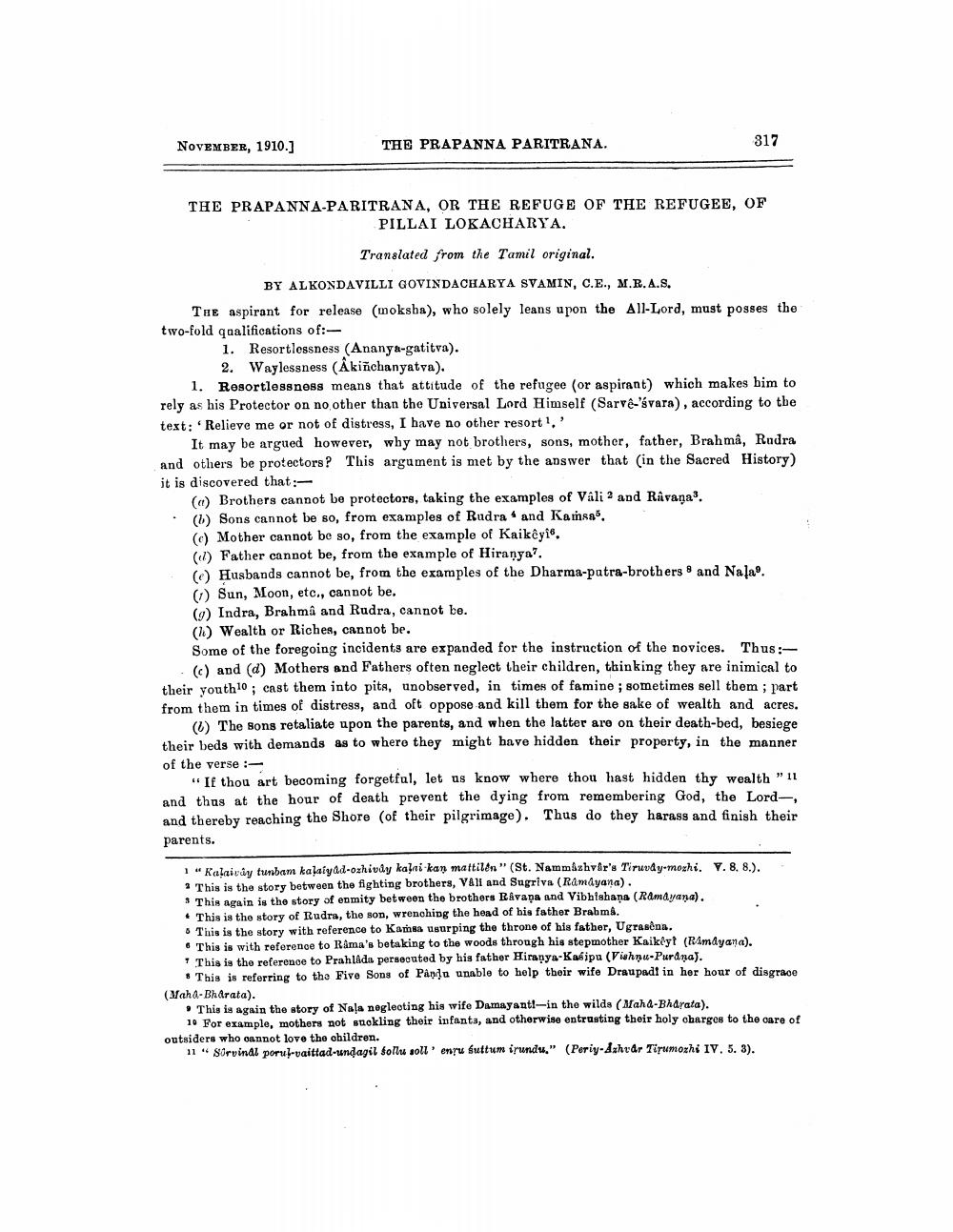________________
NOVEMBER, 1910.)
THE PRAPANNA PARITRANA.
317
THE PRAPANNA-PARITRANA, OR THE REFUGE OF THE REFUGEE, OF
PILLAI LOKACHARYA.
Translated from the Tamil original. BY ALKONDAVILLI GOVINDACHARYA SVAMIN, C.E., M.R.A.S. The aspirant for release (moksha), who solely leans upon the All-Lord, must posses the two-fold qualifications of: -
1. Resortlessness (Ananya-gatitva).
2. Waylessness (Âkiñchanyatva). 1. Resortlessness means that attitude of the refugee (or aspirant) which makes bim to rely as his Protector on no other than the Universal Lord Himself (Sarvesvara), according to the text: Relieve me or not of distress, I have no other resort,
It may be argued however, why may not brothers, sons, mother, father, Brahmâ, Rudra and others be protectors? This argument is met by the answer that in the Sacred History) it is discovered that:
(c) Brothers cannot be protectors, taking the examples of Vali 2 and Ravana'. (6) Sons cannot be so, from examples of Rudra . and Kansas (c) Mother cannot be so, from the example of Kaikeyis. (11) Father cannot be, from the example of Hiranya7.
Husbands cannot be, from the examples of the Dharma-patra-brothers 8 and Nala. (1) Sun, Moon, etc., cannot be. (9) Indra, Brahma and Rudra, cannot be. (1) Wealth or Riches, cannot be. Some of the foregoing incidents are expanded for the instruction of the novices. Thus:
(c) and (d) Mothers and Fathers often neglect their children, thinking they are inimical to their youth10; cast them into pita, unobserved, in times of famine; sometimes sell them; part from them in times of distress, and oft oppose and kill them for the sake of wealth and acres.
6) The Sons retaliate upon the parents, and when the latter are on their death-bed, besiege their beds with demands as to where they might have hidden their property, in the manner of the verse :
" If thou art becoming forgetful, let us know where thou hast hidden thy wealth "11 and thus at the hour of death prevent the dying from remembering God, the Lord, and thereby reaching the Shore (of their pilgrimage). Thus do they harass and finish their parents.
1 Ralaiviy tumbam kalaiydd-ozhivdy kafai kan mattilen" (St. Nammázhvar's Tirudy-mochi. Y. 8. 8.). * This is the story between the fighting brothers, Vall and Sugriva (Ramayana).
This again in the story of enmity betweon the brothers Rivapa and Vibhlshana (Ramayana). * This is the story of Rudra, the son, wrenching the head of his father Brabma. • This is the story with reference to Kansa ugurping the throne of his father, Ugrasons. . This is with reference to Rama's betaking to the woods through his stepmother Kaikly! (Ramdyana).
This is the reference to Prahlada persecuted by his father Hiranya-Kasipu (Vishnu-Purana). . This is referring to the Five Sons of Pandu unable to help their wife Draupadl in her hour of disgrace (Maha-Bharata).
• This is again the story of Naļa nogleoting his wife Damayant1-in the wilds (Mahd-Bhdrata).
10 For example. mothers not suokling their infanta, and otherwise entrusting their holy charges to the care of outsiders who cannot love the children.
11 Sorvinal poruk-vaittad-undagil folha soll' enru suttum irundu." (Poriy-xhuar Tirumozhi IV. 5. 3).




